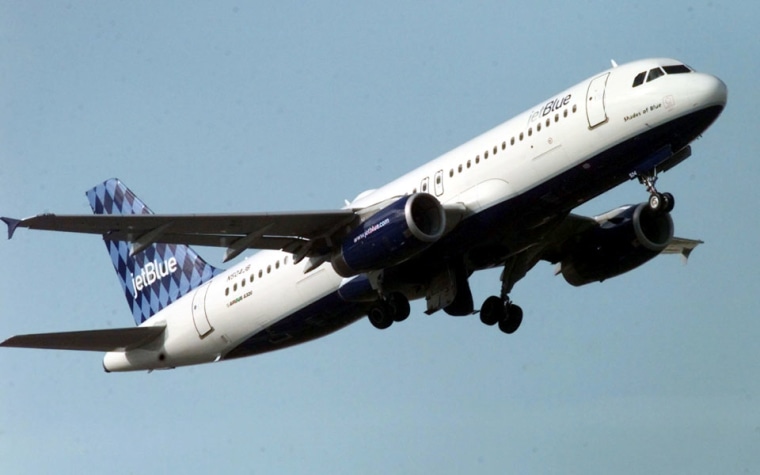It was bound to happen eventually.
JetBlue Airways is hitting its first major patch of turbulence in its four-and-a-half-year history. The New York-based carrier said Wednesday that third-quarter earnings would be "significantly lower" than previous estimates because of higher fuel costs, weak yields and bookings, and the effects of what is turning out to be a devastating hurricane season in Florida.
While the problems are not fatal by any means, things could get worse over the next few quarters. JetBlue's costs will rise as it takes delivery of its first non-Airbus aircraft in mid-2005 and moves forward with plans to build a new terminal and new hangar at New York's John F. Kennedy International Airport.
The company didn't say specifically what its new guidance was, but in a statement Chairman David Neeleman said the company would still be "solidly profitable." Analysts had been expecting 19 cents per share.
Even before weather affected the company, JetBlue was already feeling the pinch of its rapid expansion. The company has steadily added routes and planes, which helped propel it to nearly $1 billion in revenue in 2003. Through the first half of this year, the company turned in revenue of $608 million, up from $461 million in the first half of last year. But its second-quarter profit fell short of Wall Street expectations by 2 cents per share, based on higher fuel costs and price competition on routes across the U.S.
Still, these days any profit in the airline business is a rarity. Most of the major carriers are struggling to just survive. Delta Air Lines unveiled the details of a restructuring plan designed to avert bankruptcy, including thousands of layoffs. The company will also cease to use the Dallas-Fort Worth airport as one of its hubs.
Other airlines are scavenging for additional revenue any way they can. AMR's American Airlines, Northwest, Continental Airlines and US Airways Group have recently tacked on additional fees for customers who purchase tickets on the telephone or in person at the airport. (Northwest rescinded the fee for tickets purchased through systems that travel agents use.) JetBlue has not had to institute such fees because most of its tickets are sold online, compared with about 25 percent for most of the major carriers.
And while rising fuel prices hurt all the carriers, JetBlue is better positioned than most. According to research by Merrill Lynch, the company has hedged 42 percent of its fuel prices for the rest of the year. Delta, by contrast, has not hedged any of its fuel costs in its most recent quarter, which means it paid whatever the spot market would bear.
Southwest Airlines, the granddaddy of discount carriers, has hedged 80 percent of its fuel, capping prices at under $24 per barrel. American is hedged at 13 percent, Northwest at 19 percent and US Airways at 16 percent.
JetBlue's shares, at $22, have been nearly halved from their 52-week high, set in October. According to a research note from Standard and Poor's, the shares are "trading above other discount peers while facing competitive pressures and continuing margin contraction."
